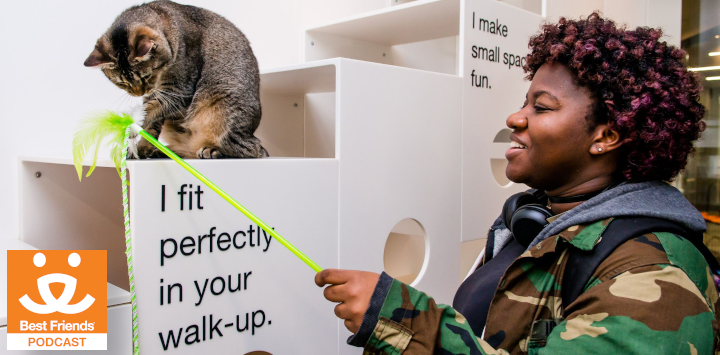
The Best Friends Podcast Episode 81
Have you ever owned a pet you acquired for free as a stray? Do you love that pet any less than others you’ve had in your life?
For decades the conventional wisdom was that charging adoption fees was the right thing to do. It would dissuade anyone from a spur-of-the-moment decision that might end in a return, and not charging a fee would devalue the pet, and in turn, adopters wouldn’t love the pet the same. If you can get it for free, why care for it? After more than twenty years of this research, there is no evidence that reducing or eliminating adoption fees does either of those things. So why do we still see so much resistance to it?
This week we talk with Dr. Karen Sheppard, the director of Huntsville Animal Services in Alabama, who shares how adoption promotions played a role in taking Huntsville to where it is today - a no-kill model for the entire nation.
Click here to check out all the episodes from the podcast.
 Resources from this episode
Resources from this episode- Best Friends Network: Reduced Fee Adoptions: Why They Work
- Best Friends Network: Removing Rescue Roadblocks
- Best Friends Network: Adoptions Training Playbook
- Maddie's Fund: Free Pet Adoptions Study Results
- Maddie's Fund: Removing Barriers to Adoption
- HSUS: Adopters Welcome manual
- Humane Pro: 'Return' is not a dirty word

Dr. Karen Sheppard
director, Huntsville Animal Services
Dr. Karen Hill Sheppard pursued a career in veterinary medicine because of her passion for animals. She is a 1992 graduate of Auburn University's College of Veterinary Medicine. Until she accepted her current position as Director of the Huntsville Animal Services municipal shelter in the fall of 2002, Karen practiced small animal medicine and surgery.
Huntsville Animal Services finally achieved a 90% live release rate in 2015. The foundation of the community's success was the creation and funding of a low-income pet sterilization program in 2008, which lowered annual shelter intake from 10,000 to 5,000 animals. By adding a community cat diversion program, lowering adoption fees and being transparent, the shelter staff is now fully engaged with the community. The ongoing goal is to continue to improve in order to save every life possible.
Dr. Hill Sheppard completed a year-long Maddie's University of Wisconsin-Madison Shelter Medicine/UC Davis Koret Shelter Medicine Fellowship, which provides shelter veterinarian Fellows with additional training to help them deliver life-saving knowledge and services to our nation's homeless pets.
Currently, Karen's family consists of dogs (Rat Dog, Marmot, Bunny and Squirrel), cats, horses and her animal-loving, tolerant husband, Fred. In her free time, she enjoys spending time with horses, clicker training, hiking and iPhone photography.
 Episode Transcript
Episode Transcript



